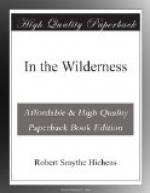The spot for a shanty is selected. This side shall be its opening, towards the lake; and in front of it the fire, so that the smoke shall drift into the hut, and discourage the mosquitoes; yonder shall be the cook’s fire and the path to the spring. The whole colony bestir themselves in the foundation of a new home,—an enterprise that has all the fascination, and none of the danger, of a veritable new settlement in the wilderness. The axes of the guides resound in the echoing spaces; great trunks fall with a crash; vistas are opened towards the lake and the mountains. The spot for the shanty is cleared of underbrush; forked stakes are driven into the ground, cross-pieces are laid on them, and poles sloping back to the ground. In an incredible space of time there is the skeleton of a house, which is entirely open in front. The roof and sides must be covered. For this purpose the trunks of great spruces are skinned. The woodman rims the bark near the foot of the tree, and again six feet above, and slashes it perpendicularly; then, with a blunt stick, he crowds off this thick hide exactly as an ox is skinned. It needs but a few of these skins to cover the roof; and they make a perfectly water-tight roof, except when it rains. Meantime busy hands have gathered boughs of the spruce and the feathery balsam, and shingled the ground underneath the shanty for a bed. It is an aromatic bed: in theory it is elastic and consoling. Upon it are spread the blankets. The sleepers, of all sexes and ages, are to lie there in a row, their feet to the fire, and their heads under the edge of the sloping roof. Nothing could be better contrived. The fire is in front: it is not a fire, but a conflagration—a vast heap of green logs set on fire—of pitch, and split dead-wood, and crackling balsams, raging and roaring. By the time, twilight falls, the cook has prepared supper. Everything has been cooked in a tin pail and a skillet,—potatoes, tea, pork, mutton, slapjacks. You wonder how everything could have been prepared in so few utensils. When you eat, the wonder ceases: everything might have been cooked in one pail. It is a noble meal; and nobly is it disposed of by these amateur savages, sitting about upon logs and roots of trees. Never were there such potatoes, never beans that seemed to have more of the bean in them, never such curly pork, never trout with more Indian-meal on them, never mutton more distinctly sheepy; and the tea, drunk out of a tin cup, with a lump of maple-sugar dissolved in it, —it is the sort of tea that takes hold, lifts the hair, and disposes the drinker to anecdote and hilariousness. There is no deception about it: it tastes of tannin and spruce and creosote. Everything, in short, has the flavor of the wilderness and a free life. It is idyllic. And yet, with all our sentimentality, there is nothing feeble about the cooking. The slapjacks are a solid job of work, made to last, and not go to pieces in a person’s stomach like a trivial bun: we might record on them, in cuneiform characters, our incipient civilization; and future generations would doubtless turn them up as Acadian bricks. Good, robust victuals are what the primitive man wants.




